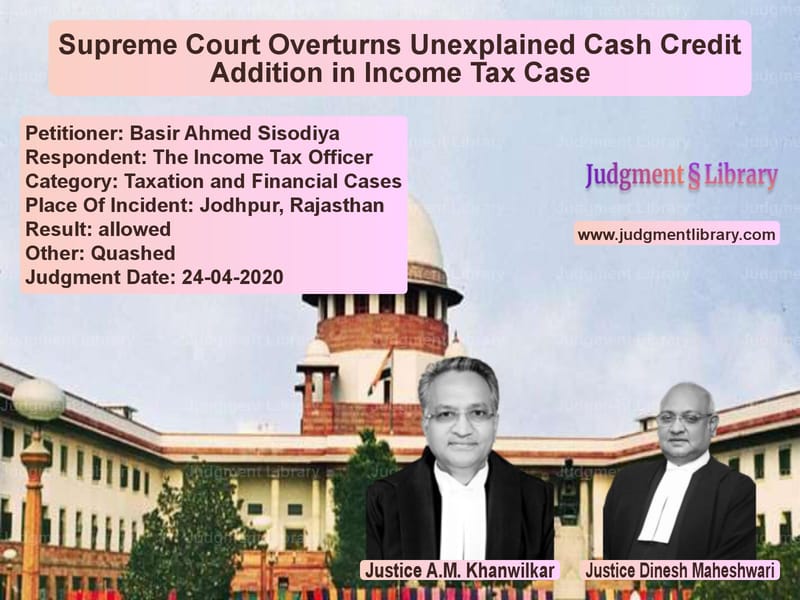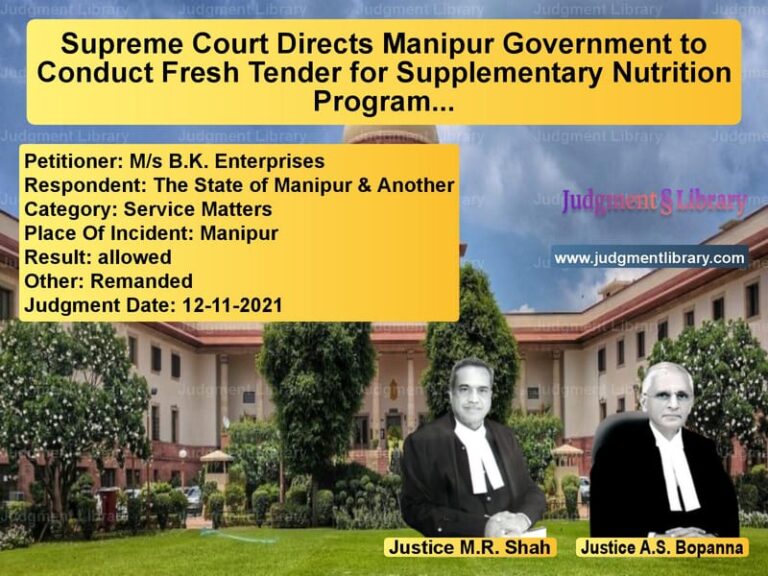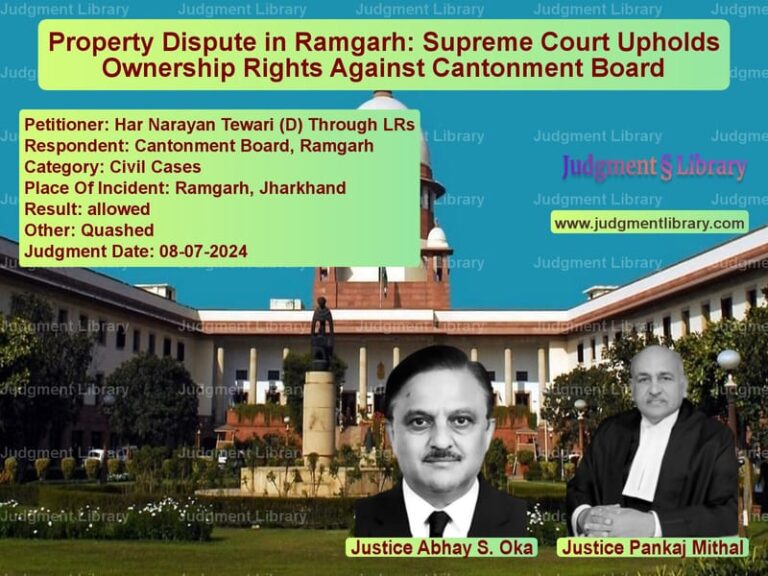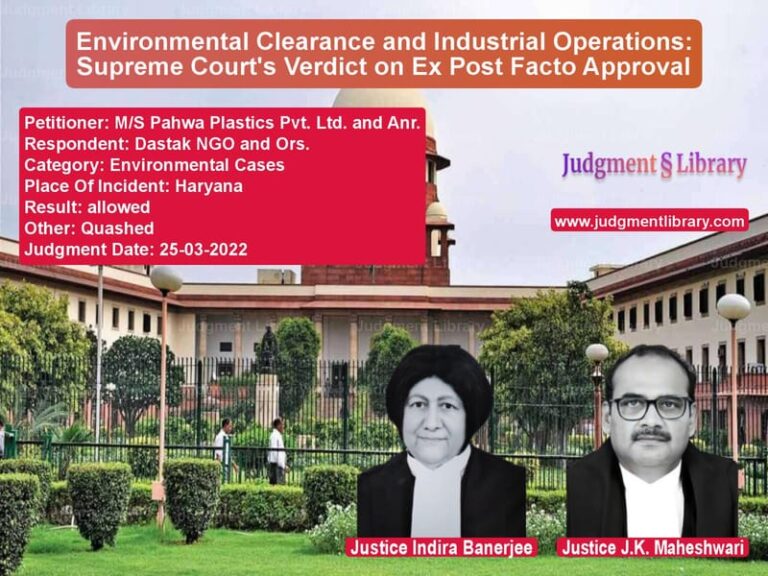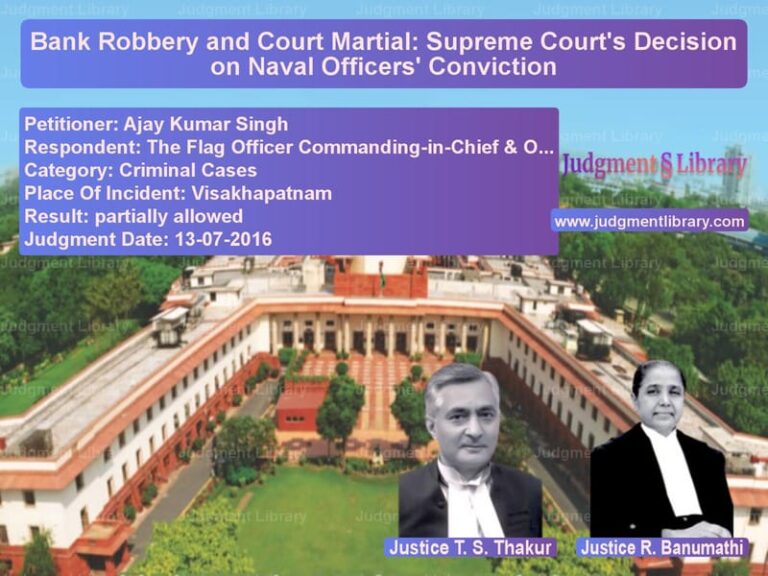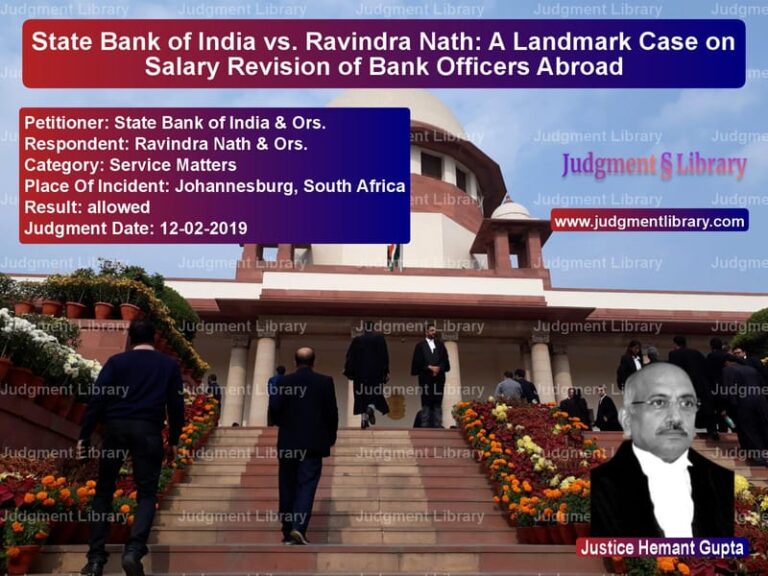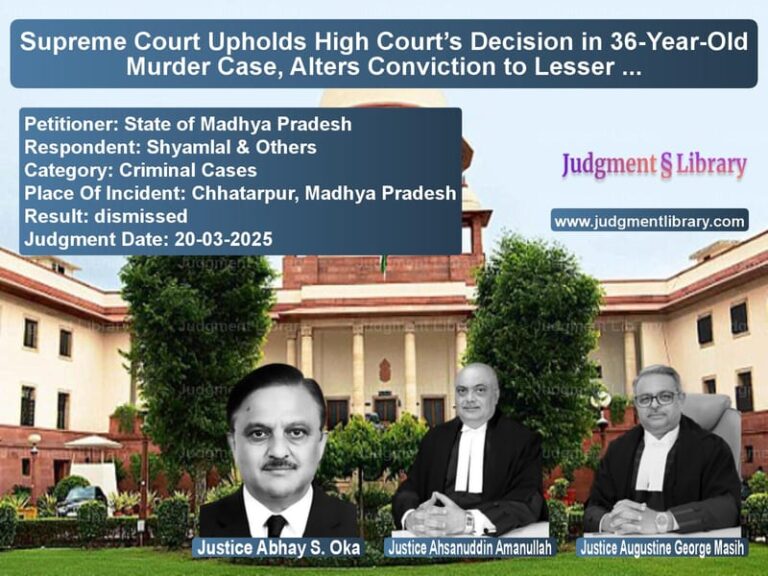Supreme Court Overturns Unexplained Cash Credit Addition in Income Tax Case
The Supreme Court of India, in the case of Basir Ahmed Sisodiya vs. The Income Tax Officer, has ruled on the issue of unexplained cash credits under Section 68 of the Income Tax Act, 1961. The Court examined whether the additions made to the appellant’s income by treating certain credits as unexplained were legally justified.
Background of the Case
The appellant, Basir Ahmed Sisodiya, was issued a notice under Section 143(2) of the Income Tax Act for the assessment year 1998-99. The Assessing Officer (AO) passed an assessment order on 30.11.2000, adding Rs.2,26,000/- under Section 68 as unexplained cash credits.
The assessment order stated that the appellant had shown credits in the names of 15 persons, but he failed to substantiate the authenticity of these transactions. As a result, the AO treated these amounts as unexplained and added them to the appellant’s total income.
The appellant challenged this decision before the Commissioner of Income Tax (Appeals) [CIT(A)], and later before the Income Tax Appellate Tribunal (ITAT), but both authorities upheld the AO’s order. The appellant then approached the Rajasthan High Court, which also dismissed the appeal on 21.8.2008. Finally, the appellant brought the matter before the Supreme Court.
Key Legal Issues Raised
- Whether the cash credits of Rs.2,26,000/- could be treated as unexplained under Section 68.
- Whether the Assessing Officer was justified in rejecting the books of accounts while simultaneously relying on them for making the additions.
- Whether sufficient opportunity was given to the appellant to explain the credits.
- Whether the High Court erred in upholding the addition made by the Assessing Officer.
Petitioner’s Arguments
The appellant put forth the following contentions:
- The AO could not reject the books of accounts for the purpose of determining gross profit while simultaneously relying on them to make additions under Section 68.
- His purchases were made from unregistered dealers, but their existence was real and verifiable.
- The unregistered dealers had provided affidavits confirming that they had sold goods to him on credit.
- The CIT(A) later acknowledged in a penalty proceeding that the dealers were real and had sold goods on credit.
- He had not concealed any income, and the burden of proof placed on him was unfair.
Respondent’s Arguments
The Income Tax Department defended its decision, arguing:
- The appellant failed to produce any reliable evidence during the assessment proceedings to prove the genuineness of the credits.
- The purchases were shown as credit in the books, but no identity or source of income of the creditors was provided.
- The AO gave multiple opportunities to the appellant to prove the transactions, but he failed to do so.
- The findings of fact recorded by the AO were affirmed by both CIT(A) and ITAT, and no interference was warranted.
Supreme Court’s Observations and Ruling
The Supreme Court reviewed the factual matrix and noted:
- The penalty proceedings initiated under Section 271(1)(c) against the appellant were later dropped.
- During the penalty proceedings, affidavits and statements from 12 out of the 13 unregistered dealers were recorded, and their identities were verified.
- The CIT(A), in its order dated 13.1.2011, found that there was no concealment of income by the appellant.
- The appellate authority observed that without the purchases, the sales and closing stock reported by the appellant could not have existed.
- Since the appellate authority had later accepted the appellant’s explanation, the foundation of the addition made under Section 68 had collapsed.
The Supreme Court concluded:
“The factual basis on which the Officer formed his opinion in the assessment order dated 30.11.2000, in regard to the addition of Rs.2,26,000/-, stands dispelled by the affidavits and statements of the concerned unregistered dealers in penalty proceedings. That evidence fully supports the claim of the appellant.”
Accordingly, the Court held that the addition of Rs.2,26,000/- under Section 68 was unjustified and directed that it be deleted.
Key Takeaways from the Judgment
- Burden of Proof on the Assessee: Section 68 requires the assessee to prove the genuineness of credits, but where independent evidence supports the transactions, the addition cannot be sustained.
- Penalty and Addition Under Section 68: If penalty proceedings conclude that there was no concealment of income, the corresponding addition in the assessment order may lose its legal basis.
- Rejection of Books of Accounts: If an AO rejects the books of accounts, he cannot selectively rely on them for making adverse additions.
- Role of Subsequent Proceedings: The Court’s reliance on later penalty proceedings shows that fresh evidence can sometimes overturn earlier adverse findings.
Conclusion
This judgment is a significant ruling in income tax law, particularly concerning unexplained cash credits. The Supreme Court reinforced that procedural fairness and the rule of law must prevail in tax assessments. The ruling provides relief to taxpayers who face arbitrary additions despite having genuine business transactions.
The case also underscores the importance of producing adequate evidence during assessment proceedings and how later appellate findings can influence the final outcome. This decision will likely serve as a precedent in future cases involving similar issues under Section 68.
Petitioner Name: Basir Ahmed Sisodiya.Respondent Name: The Income Tax Officer.Judgment By: Justice A.M. Khanwilkar, Justice Dinesh Maheshwari.Place Of Incident: Jodhpur, Rajasthan.Judgment Date: 24-04-2020.
Don’t miss out on the full details! Download the complete judgment in PDF format below and gain valuable insights instantly!
Download Judgment: Basir Ahmed Sisodiya vs The Income Tax Offic Supreme Court of India Judgment Dated 24-04-2020.pdf
Direct Downlaod Judgment: Direct downlaod this Judgment
See all petitions in Income Tax Disputes
See all petitions in Tax Evasion Cases
See all petitions in Tax Refund Disputes
See all petitions in Judgment by A M Khanwilkar
See all petitions in Judgment by Dinesh Maheshwari
See all petitions in allowed
See all petitions in Quashed
See all petitions in supreme court of India judgments April 2020
See all petitions in 2020 judgments
See all posts in Taxation and Financial Cases Category
See all allowed petitions in Taxation and Financial Cases Category
See all Dismissed petitions in Taxation and Financial Cases Category
See all partially allowed petitions in Taxation and Financial Cases Category

